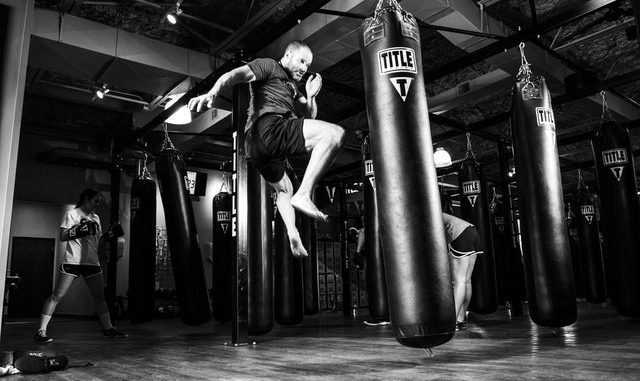
I won’t give you any BS. I’ve been a martial artist and an athlete of different sports all my life. In some times of my life I was self-taught. In other parts, I was helped by the most awesome coaches ever.
I can say that are lots of sports and skills you can teach yourself and reach a pretty high skill level.
Chess, web development, writing, painting are some examples of skills you can learn on your own through books and online resources. But how about MMA?
The answer of course depends.
- We have to first define what do you mean by “self-taught” MMA.
- Next, we have to define what do you mean by “learning MMA” or why do you want to learn
After this we’re going to answer two questions:
Finally, I am going to give some
Defining what you mean by “self-taught”
There can be many levels of being “self-taught” in MMA. Let’s dive in.
The truly self-taught
One the most extreme level of being “self-taught” is someone who locks himself at home and learns from YouTube, martial arts books and watching UFC.
These people work on the bag, exercise at home and do shadow boxing.
Why would someone try to be completely self-taught?
It’s the only option for some martial artists. This is true especially people from the MFTWM tribe who are just working all the d*mn time, don’t have any friends to train with, or don’t have the money to spend on joining an MMA club.
Maybe you’re on quarantine and you want to continue learning.
Some people might give them some heat for trying to learn MMA on their own.
But in my book this is totally cool. Despite the challenges of life they are still on your learning path.
Training with a group
There is the still a group of people who are self-taught in the sense that they belong to a group, or maybe are even leading a group of people who have the goal of learning MMA.
There are lots of groups like this. They can range from informal groups of friends who mess around boxing gloves to well-organized clubs that charge membership.
A lot of the other non-MMA martial arts that are entering MMA, for example a kickboxing club that wants to field MMA fighters in a competition can fall in this category.
This is perfectly legit. MMA is not like many martial arts (or even BJJ for that matter) that has a lineage where you can only learn from a master who learned from an older master.
MMA is basically a sport not a traditional martial art.
If your group an produce a good MMA fighter who can dominate the MMA fight leagues, guess what? You’re an MMA group too.
Training with different teams and clubs but no main coach
There are those who go solo in the sense that they are don’t have a main coach but they seek knowledge with different teachers.
I like to call these people dojo drifters. They train with different teams and clubs, maybe trying to get the best out of each.
Dojo drifters like this might train with a wrestling club, a BJJ club, boxing club and a Judo club.
They have coaches for each of these martial arts or sports, but at the end of the day, they are still they ones who are calling the shots which class to attend or which teams they train with that week.
Then, they mix it all up and participate in MMA competitions, or just consider themselves MMA fighters (more on this later).
This ethos is okay in my book. As Bruce Lee said:
“Absorb what is useful, reject what is useless, add what is essentially your own”
Training with a main coach but not an MMA coach
Some self-taught MMA fighters may still have a main coach, but he may not necessarily be an MMA coach.
You usually see this in other martial arts or combat sports that are transitioning to MMA.
A self-taught MMA fighter for example may have an awesome wrestling coach. Or, a fighter can identify with a particular kickboxing team.
However, learning the other skills need for MMA will already be up to that fighter.
Defining what you mean by “learning MMA”
To first answer this question whether MMA can be self-taught, you must first define what do you mean “learning MMA.” There are lots of levels to learning a skill and MMA is no exception.
For example, saying I want to “learn Spanish” can mean a lot of things. It can range from being able to order a taco in Spanish all the way to being able to achieve native fluency.
Same thing with MMA. It depends on what your learning goals are.
Below are some MMA skill levels or goals self-teaching MMA fighters aspire for.
Casual understanding
Some learners just want to learn to be able to have a basic understanding of the sport.
They want to know how a double-leg down is done.
They want to be able to show some friends how to do an armbar.
They would like to identify they moves they see on the UFC.
Lots of people start this way.
Then they get sucked down that rabbit hole and end up being an MMA-crazed fighter.
Functional combat and self-defense
There are those who want to learn because they want to be able to use MMA when the need arises.
These are the people who want to be the person who bashes heads instead of getting his head bashed in at the bar.
This level is for those who want to help their kids stand up to bullies or for self-defense on the street.
These are also the people who want to defend themselves and loved ones from criminal elements.
MMA is a combat sport that is good reflection of actual hand-to-hand combat.
Low-level competition
There are those who just want self-learn the sport of MMA for the ultimate act in becoming an MMA fighter – actually joining an MMA competition.
Those who want to learn MMA to actually join MMA competitions want completeness in their journey.
I find this a sacred journey. Joining any MMA competition, even small (but safe) neighborhood ones a life changing experience.
High-level competition
Finally, there are those who want to teach themselves MMA to be really good professional fighters.
They just catch that MMA bug and want to be really awesome fighters.
I been there too. And it’s a crazy ride.
But how far can you go in the MMA world for those who are self-taught? More on that in a bit.
Are there successful MMA fighters who are self-taught?
In this article they talk about two UFC fighters who are supposedly self-taught. But just to be clear, in our spectrum of “self-taught-ness” these fighters are probably in the level discussed above of training with different teams or clubs but no main coach.
That’s the most “self-taught” level you can be to join high-level competition.
The honest and brutal truth is you can’t be a world-class MMA fighter if you don’t train with any coach.
However, just because being a self-taught fighter you won’t get you to the UFC, you can still get pretty good.
How far can you go without a coach?
Even without having a main MMA coach you can still improve a lot.
I’d say you can good enough to join low-level competitions.
After all, if you can street fight you can step in an MMA cage or ring. You might not win, but hey, you’ll be a bonafide MMA competitor.
Without training with anybody (level of training with a group of friends), you might be able to convince the organizer of a low-level MMA competitions to put you on their fight card. but you won’t be any good.
With striking skills you might be able to pull off a few good moves just by training at home. However, your grappling is 100% sure to be non-existent to abysmal.
No amount of shadow-boxing will get you used to being punched in the face.
No amount of book study will teach you to pull of good submissions from the guard.
Can you learn how to swim just by reading a book on swimming? You got to get into the water.
There’s really a lot of skill and technique that goes into being a good MMA fighter and pure athletic ability, raw aggression and self-practice won’t hack it.
Don’t get me wrong. You can improve tremendously by reading and learning on your own when others won’t. I remember technically dominating my high school Judo club sparring partners by studying Judo classics (and lots of hard training). However…
Having a few people to train with can make big difference
That said you can get really pretty good in MMA (at least for lower-level competition) as long as you have people to train with.
From going to zero to even just having one sparring partner will result in a quantum leap of skills.
Sparring is an absolutely essential component to learn MMA. Sparring itself is a skill you have to learn and you should try lean methodogically. You just can’t go around unleashing male agression and giving each other concussion. (Read: On Sparring: A Guide for Beginners)
Of course, to spar you really need to train with a group or groups of people.
Tips for those wanting to teach themselves MMA
Okay, so you are really in the position in life where your only option is to keep learning MMA on your own. So what should you look for
Choose your sources wisely
There is a wealth of information online. Find a person or author who has real experience in fighting. Be wary of internet gurus… But there’s also no need to be too wary.
Just because the person is not a UFC champion doesn’t mean he can’t teach you good fighting. A lot of what fighting is still pretty basic, and it doesn’t take world champ to teach it.
As long as the resource is based on what actually works in the MMA cage or ring (or mat) and isn’t too advanced for you, it should be worth considering.
Stick to the basic stuff
For the self-taught learner, it would be good to stick to the basic but effective stuff.
There are lots pf fancy kicks you could practice, but you can’t over-practice the basics.
With grappling especially, there’s a big temptation to try all that fancy stuff. But what actually wins the most fight are the basic moves.
There’s some good statistics of what submission holds win the most fights in the UFC. (Read: Top 10 Most Effective Submission Techniques According to Statistics)
Just by sticking to these top submission holds, you’re doing a pretty good job on the grappling end of fighting. After all, these statistics came from the UFC, so it shows that even on a world-class level, the basic moves win fights.
Keep an open-mind and open-eyes
And open-mind for learning new ideas. One the journey of self-learning MMA, you’re bound to come-across lots of fighters from different backgrounds and clubs.
Some of what they’ll teach you will be useful. But some what you’ll learn will be gold.
An open eye for learning opportunities. Check out new clubs and possible sparring partners.
Deliberate Practice
As I was saying, don’t just go bashing each other’s skulls in or keep hitting a punch bag from sunrise to sunset.
There’s a concept called deliberate practice. You have to work on specific skills to improve in a sport or skill.
You have to take time to go into the weeds and learn good technique.
After watching a video or reading about a technique, take the time to learn it and apply it.
Keep it fun
If things aren’t fun you probably won’t stick to them for long. Also when we’re having fun we learn better. And that’s one advantage of being self-taught, you can have fun with the fun stuff.
So don’t be afraid of just deep diving into the fun suff.
If you want to practice leg-locks all day, practice leg-locks all day.
If you want to practice you’re left high-kick for that knock-out strike all day, go and do so.
Conclusion
Self-taught MMA is an exciting journey. You will be the master of your ship and the master of your destination.
Of course, learning MMA by yourself is not ideal, but there are those forced by the circumstances of life to take the self-taught path.
You can still get pretty far, learning MMA on your own, maybe enought to get a few wins in a lower-level MMA competition.
However, you won’t be any good without sparring partners.
But like many things in life, MMA is all about the journey, not the destination.




Very helpful / insightful. Thanks.